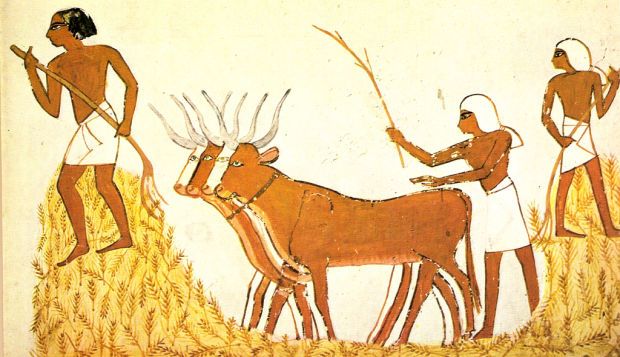
Eight thousands years ago, during the stone age and the advent of agriculture, the human race was fathered by a handful of rich farmers.
According to a theory by scientists analysing modern genes and biological anthropology, farmers who became proficient in modern agricultural methods of the time, were able to profit from their knowledge, by accumulating wealth and managing to father babies at the rate of 17 women for each single rich Male farmer. They drove other unskilful Male competitors out of the reproduction phase by dominating and luring the helpless women to the safety of their wealth and power.
It suggests our modern genes are not an equal part of half male genes and half female genes, going back throughout history. Instead the study reveals the true extent of our gene pool: One rich male farmer for every 17 common females. Therefore our human genome is derived from the time in history when it approached a 95% Female dominance due to the advent of agriculture, and the challenges it presented the planet’s Male population at the time.

BYPASS THE CENSORS
Sign up to get unfiltered news delivered straight to your inbox.
You can unsubscribe any time. By subscribing you agree to our Terms of Use
Slate.com reports:
Scientists have discovered evidence that, during the Stone Age, only one man passed on his DNA for every 17 women. That’s right, guys. Living like our ancient ancestors means having as little as a 1-in-17 shot of reliably getting laid.
Danielle Paquette at the Washington Post explains:
Researchers recently uncovered a sharp decline in genetic diversity in male lineages across the world during the Stone Age. The study’s authors hypothesized that material gains made through early agricultural success — a proxy for wealth — gave smaller groups of related men the reproductive upper hand for generations.
“Men who had more wealth and power might have had more to offer to women,” said co-author Melissa Wilson Sayres, an Arizona State University professor who studies sex-biased biology. “Their sons and grandsons could have been more successful in the same way.”
(“More to offer” is one way to think about it, but the cynic in me wonders how much choice women could really exercise in societies that were so strictly patriarchal that a few wealthy men shut all the other men out of the sexual marketplace so effectively.)
In short, the research suggests that the men who managed to have the most babies—whose babies managed to survive to adulthood and have more babies and pass their genes down to the present day—were the ones who were really good at agriculture. It’s worth noting that most evolutionary psychology proponents (or “paleofantasists” as biologist marlene zuk calls them) imagine that the “true” nature of humans developed during our pre-agricultural, hunter-gatherer phase. It’s difficult to imagine that true human nature is found in the heart of the caveman, when it’s likely that a few successful early farmers just crushed the competition in the genetic lottery.
The real takeaway here is to be skeptical of the notion that our sexual and social habits are as strongly genetically programmed as evo-psycho proponents believe. As francie diep at pacific standard writes, “As more thousands of years passed, the numbers of men reproducing, compared to women, rose again.” Far from being robots who are acting out unchanging genetic scripts, we are creatures who experience periods of dramatic change—and those changes, in turn, change our genes.
The other takeaway: to be grateful we live in an age where it’s harder for a few powerful men to snatch up all the women for themselves. That sounds terrible for both men and women.

